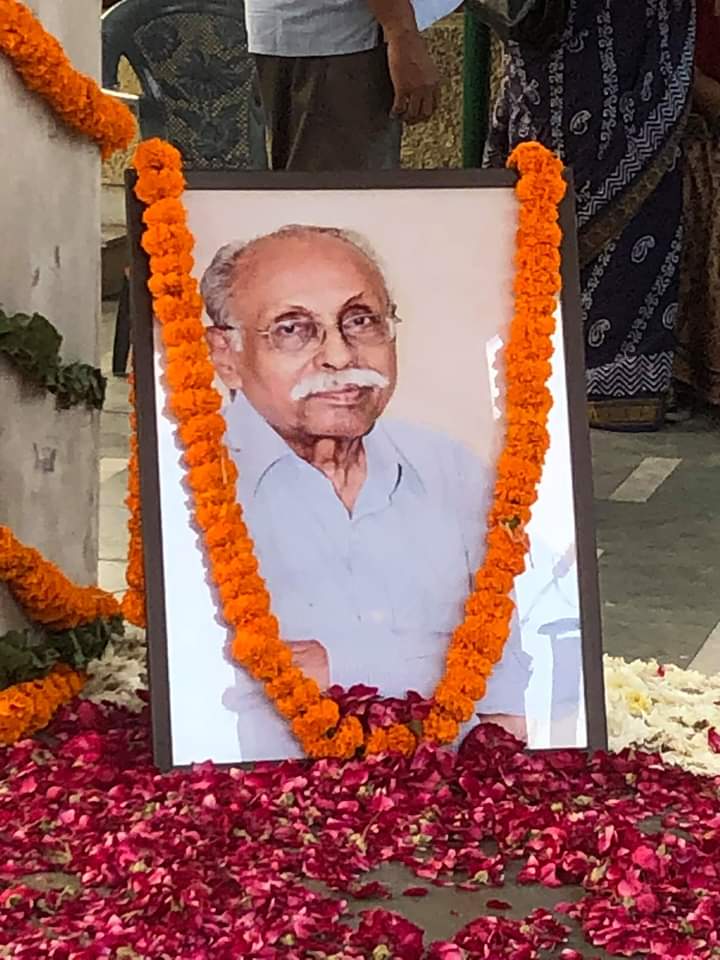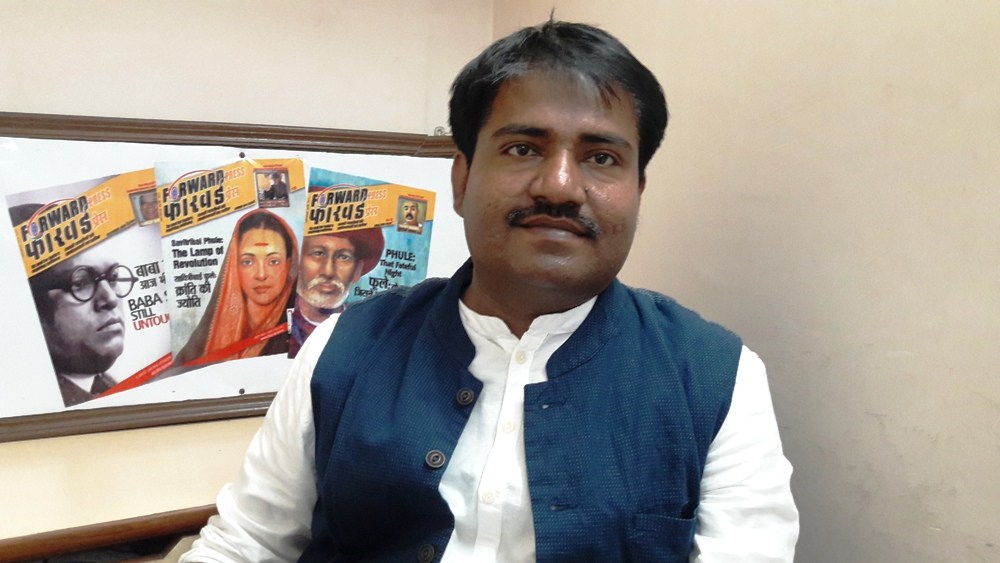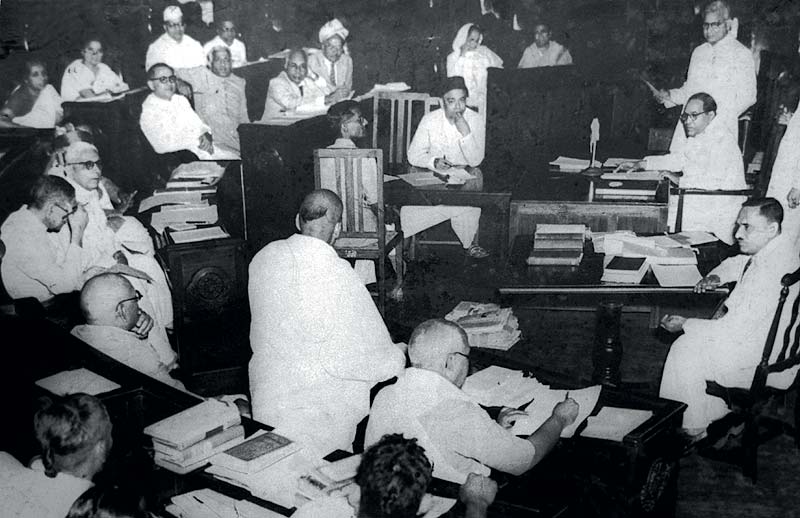Slogans of Lal Salaam and Jai Bhim rent the air at the Lodi Road crematorium in New Delhi. The slogans were not being raised for a politician. They were being raised in honour of P.S. Krishnan, a former IAS officer. He breathed his last at 5.30 am on 10 November 2019. He was 86. He had been admitted to a private hospital in Delhi for a heart-valve replacement surgery.
Krishnan’s funeral was well attended. Among those present were his wife Shanta Krishnan, a retired JNU professor; daughter Shubha Shekhar; and son-in-law Chandrashekhar. Others who bid farewell to Krishnan included former Union Ministers Mukul Wasnik and J.D. Seelam; Professor Apoorvanand, Delhi University; Communist Party of India (Marxist) leader Brinda Karat; and a number of social activists and intellectuals from the Dalit and OBC communities. IAS officers Dr Rakesh Kumar and P. Sampath Kumar were also present.
P.S. Krishnan devoted his entire life to the cause of the deprived classes of India. As an IAS officer, he played a key role in the implementation of the Mandal Commission recommendations. He was instrumental in the drafting of the SC-ST (Prevention of Atrocities) Act 1989 and earlier in the introduction of the Special Component Plan for the Scheduled Castes.

Dalit author Mohandas Nemishrai had written for FORWARD Press on the contribution of P.S. Krishnan to these causes: “The 1990s was a decade of political turbulence in India. During that period, efforts to push the Dalits – who were trying to put themselves centre stage – back to the margins of society had begun. The decade also saw the Bahujans uniting to take on the casteists. It was in the 1990s that the government put together a committee to organize the celebrations of the birth centenary of Babasaheb Ambedkar. The person who drew the contours of the committee and the celebrations was P.S. Krishnan. He played an essential role in the constitution of the committee, which included people committed to the Dalit cause. Despite being a member of the bureaucracy, Krishnan had close ties with the common man and consistently tried to solve their problems.”
Born on 30 December 1932, into an upper-caste family of Kerala, Krishnan became aware, in his childhood itself, of the societal malady called caste. After his retirement from the IAS in 1990, he shared his experiences with Dr Vasanthi Devi, a former vice-chancellor of Tamil Nadu’s Manonmaniam Sundaranar University. The interview was published in the form of a book titled A Crusade for Social Justice: Bending Governance towards the Deprived, which chronicles the history of the struggle for social justice after Independence. Forward Press will shortly be publishing the Hindi translation of this book titled Bharatiya Karyapalika Mein Samajik Nyay Ka Sangharsh: Ankahi Kahani P.S. Krishnan Ki Jubani.
While sharing his childhood experiences, he told Dr Vasanthi Devi: “In those days, I used to visit the Shri Padmanabhaswamy Temple in Thiruvananthapuram every morning along with my father. After the round of worship at the main temple and the subsidiary temples was over, there would be a long walk along the corridors within the temple premises. During such walks, I used to discuss various public issues with my father. Those were tumultuous times marked by the national independence movement, the social reform and social revolution movements, the socialist and communist movements and I was interested in issues connected with these movements. The morning after a statement by Dr Ambedkar appeared in The Times of India, I asked my father: “Who is Dr Ambedkar and why does he say that one out of every seven Indians is an ‘Untouchable’? And how can anyone be an ‘Untouchable’?” My father explained to me the phenomenon of “Untouchability” in Indian society. I am grateful to him for giving me an undistorted picture. After hearing from him the inhuman indignities imposed on the castes treated as “Untouchables”, I asked him if it is not unjust. Without hesitation, he said it is unjust. This and the atmosphere and environment in which this conversation took place decided my position against ‘Untouchability’.”
P.S. Krishnan addresses a programme to mark the 10th anniversary of Forward Press
In A Crusade for Social Justice, he revealed in detail how Dr Ambedkar’s thinking influenced him. According to him, “Dr. Ambedkar’s statement and my father’s explanation were the first clear influences that set me on the path against ‘Untouchability’, and later against the caste system as a whole. I had the good fortune to have among my early playmates and friends, boys of different communities, including boys who belonged to castes treated as ‘Untouchable’ or converts to Christianity from those castes, who continued to be treated in the same way. I remember the names Karunakaran and Fernandes, though I had no contact with them after 1941. When I heard my father’s explanation of Dr Ambedkar’s statement, my mind went back to those early friends and I could not see any logic by which they could be treated as ‘Untouchable’ or as any different from the rest. I also remember a lady, whose legs were paralyzed, to whose hut near our home I would go on some evenings after my school and would recite Malayalam poems with her. I did not know her caste, but she must have been either a Dalit or of a non-Dalit ‘lower’ caste. All these memories came to me and made it impossible for me to accept ‘Untouchability’ or caste-based discriminations in society.”
As an officer, P.S. Krishnan’s last contribution may have been getting Parliament to approve the Mandal Commission recommendations and ensuring their implementation. But even after his retirement, he continued with his mission. He contributed to the formulation of the policies of the Government of India. Whenever any government sought to implement a policy that went against the interests of the Dalits and other deprived classes or hurt them, he not only opposed it but also offered advice.
P.S. Krishnan in conversation with Forward Press
For instance, when, earlier this year, the Government of India decided to grant reservations to the economically weaker sections, Krishnan was livid. He told FORWARD Press, “It is true that there are the poor among non-OBC, non-SC and non-ST communities. There can be no two opinions on that. Most of the poor are SCs or STs and there are poor OBCs. There are the poor in the general category, too. They should be helped. The question is how to help them. Any help should be specific to the problem. Understand it in this way. If someone is suffering from TB, he should be given medicines to treat TB. If someone has vitamin deficiency, he should be given vitamins. Obviously, there cannot be one pill for all ailments. Different problems have different solutions and they should be explored. The solutions should be in consonance with the basic structure of the Constitution. They should not be against it.”
P.S. Krishnan was unambiguously for granting absolute right to Adivasis over their water, forest and land. He told Dr Vasanthi Devi, “Tribal rights and the need of the country’s economic development need not be contradictory and can be harmonized. Further, modern economic activity undertaken without disturbing individual and collective tribal rights to the surface land should be so planned that its benefits too go maximally to the STs of the area. For this, the skills required during the construction stage and the production stage of the project should be identified and the young people of the STs should be trained to acquire these skills. This should be provided, along with the establishment of high-quality residential schools and colleges and health institutions in that area with due contribution from the project-promoting organization. The entire process should be transparent and with full tribal participation. The education and skill development should not be only for securing for tribals jobs as labourers but also to equip them for technical, supervisory and managerial positions. By this the projects in tribal areas can get the entire manpower requirement from within the local tribal area without having to bring people from outside …”
A powerful voice in the favour of the Dalitbahujans in the government and the administration has fallen silent. Let us hope that Krishnan – who rose above the distinctions of caste and creed and struggled all his life for upholding human values – will become a beacon for those who believe in the ideal of an India free from casteism and other kinds of discrimination.
Translation: Amrish Herdenia; copy-editing: Anil
Forward Press also publishes books on Bahujan issues. Forward Press Books sheds light on the widespread problems as well as the finer aspects of Bahujan (Dalit, OBC, Adivasi, Nomadic, Pasmanda) society, culture, literature and politics. Contact us for a list of FP Books’ titles and to order. Mobile: +917827427311, Email: info@forwardmagazine.in)






